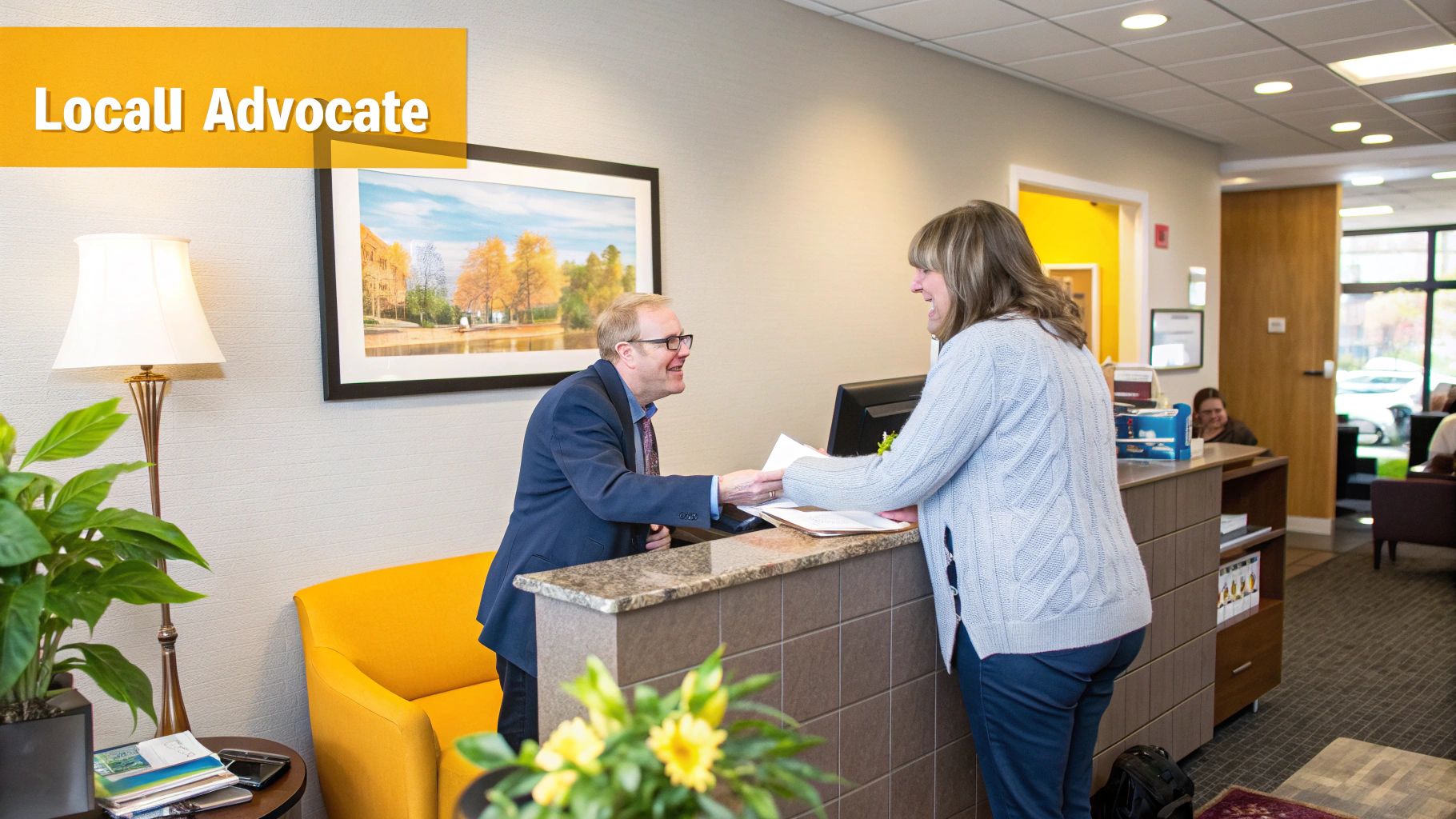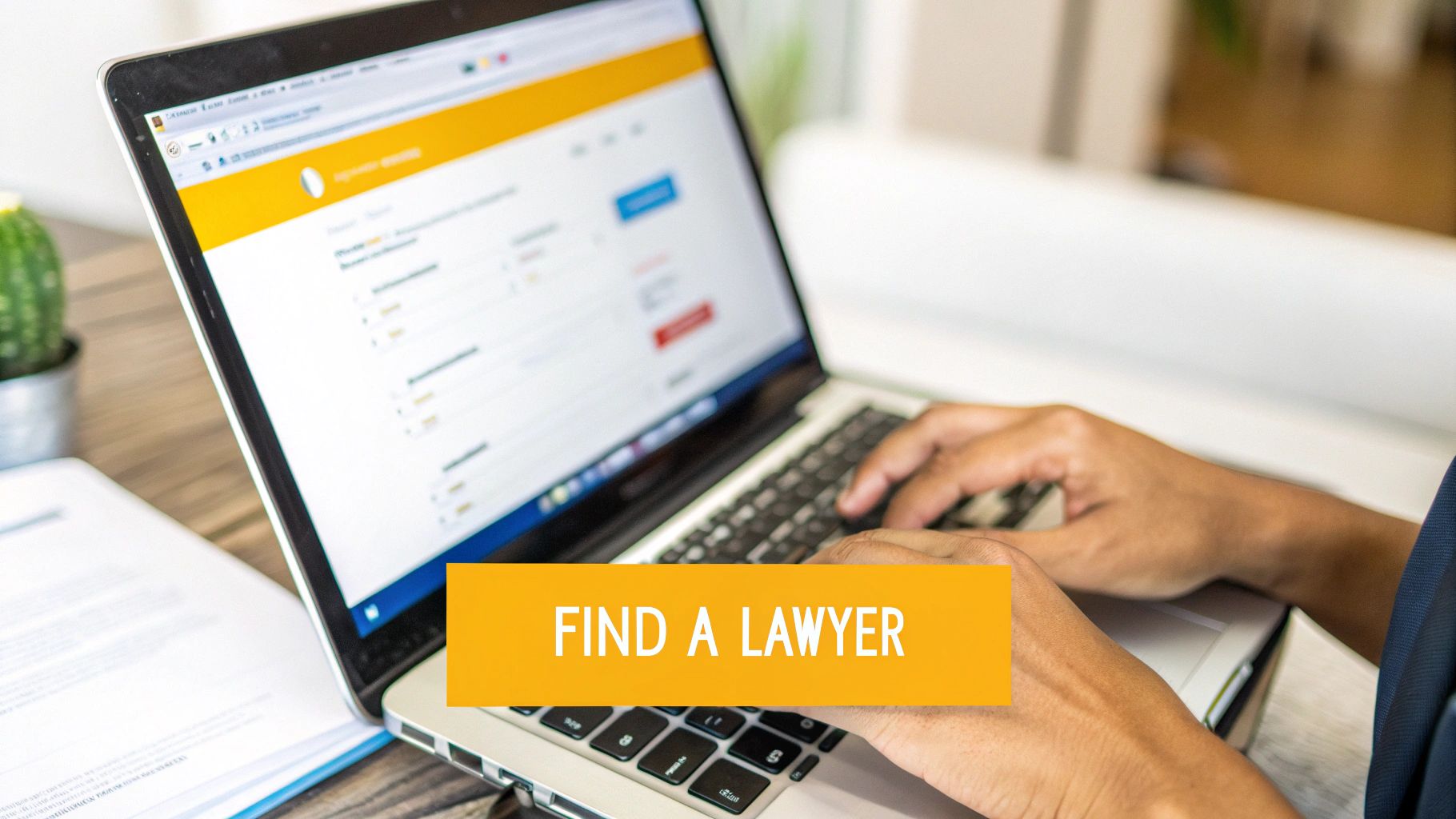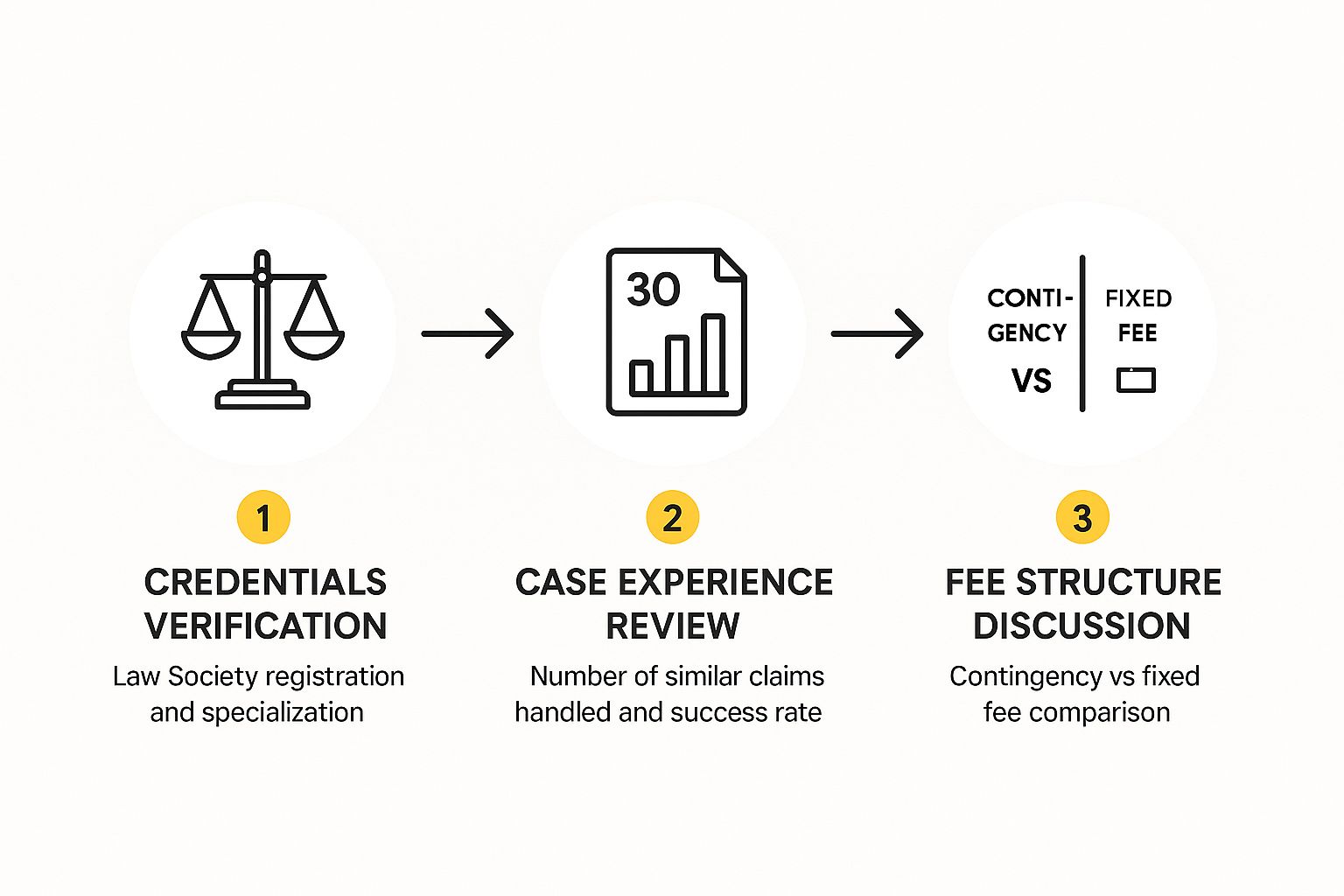Find a Disability Lawyer Near Me in Ontario
When you type “disability lawyer near me” into a search bar, you’re not just looking for a name and a phone number. You’re searching for a local advocate, someone who genuinely understands the hurdles people in Ontario face when their ability to work is taken away.
Having an experienced lawyer who practises in Burlington and serves the entire GTA makes a world of difference. They bring critical local knowledge to the table—familiarity with the specific medical experts, insurance company tactics, and court procedures that will shape your case. Frankly, this local insight is often what tips the scales toward a successful claim.
Why Finding the Right Local Lawyer Matters

Being denied disability benefits is a deeply personal and stressful ordeal. The last thing you need is a lawyer who is out of their depth, unfamiliar with the very community where your claim will be decided. A local Ontario lawyer offers clear advantages that a firm from another province simply can’t replicate.
For one thing, they’ve built relationships with local medical specialists whose reports and opinions carry significant weight with both insurance companies and the courts. This is absolutely essential, as compelling medical evidence is the bedrock of any disability claim.
The Ontario Advantage in Your Corner
Fighting a disability claim means navigating uniquely Canadian legal systems, whether it’s a private long-term disability (LTD) policy or a government program like the Canada Pension Plan (CPP) Disability benefit. An Ontario-based lawyer lives and breathes these systems every day.
Here’s what that local expertise really means for you:
- They Know the Insurers’ Playbook: Local lawyers have seen the common denial tactics used by insurance companies operating across the GTA. They can anticipate these moves and build a proactive case to dismantle them from the start.
- They Understand Provincial Law: They have a deep understanding of Ontario’s Insurance Act and how its specific rules apply to your policy, ensuring no critical detail gets missed.
- They Have a Network of Local Experts: A lawyer in your area can connect you with trusted local vocational experts and medical assessors—the very people whose testimony can make or break your claim.
A lawyer from another province might know the general principles of disability law, but they won’t know the specific judges, the opposing counsel, or the key medical professionals in your community. That kind of localized insight is priceless when your financial stability is at stake.
Choosing the right person to represent you isn’t just about finding legal skill; it’s about finding a partner who operates in your world. They get the challenges unique to residents from Burlington to Toronto and all across the province.
Before getting into the weeds of your insurance policy, it’s a good idea to brush up on the basics. Our guide to long-term disability insurance in Canada is a great place to start. Arming yourself with this knowledge helps you ask the right questions and ultimately choose the best advocate for your fight.
To help you in your search, I’ve put together a quick-reference table outlining the key qualities you should be looking for in an Ontario disability lawyer.
Key Traits of a Top Ontario Disability Lawyer
| Essential Quality | Why It’s Crucial for Your Claim | How to Confirm It |
|---|---|---|
| Exclusive Focus on Disability Law | This isn’t a field for generalists. You need someone who lives and breathes disability claims, not a lawyer who just dabbles in it. | Check their website’s “Practice Areas.” Does it list only disability law, or is it one of a dozen other specialties? |
| Local Courtroom Experience | A lawyer familiar with local judges and opposing counsel has a strategic edge. They know the personalities and arguments that are most effective. | Ask them directly: “How often are you in court in this region?” and “Are you familiar with the lawyers for [Insurance Company]?” |
| Contingency Fee Structure | This means they don’t get paid unless you do. It aligns their success with yours and removes upfront financial barriers for you. | This should be clearly stated on their website or in the initial consultation. Ask for a copy of their fee agreement. |
| Positive Client Testimonials | Past client experiences are a powerful indicator of how you’ll be treated. Look for reviews that mention communication and compassion. | Check Google Reviews, lawyer directories, and their own website. Look for detailed, authentic-sounding feedback. |
| Access to Medical Experts | A top lawyer has a network of respected medical and vocational specialists to provide strong evidence for your claim. | During your consultation, ask about the types of experts they work with and how they build the medical evidence for a case like yours. |
Having this checklist in hand during your initial consultations will help you cut through the noise and identify a legal partner who is truly equipped to win your case.
Where to Find a Qualified Disability Lawyer

Starting the hunt for the right disability lawyer can feel overwhelming. A quick Google search will give you endless results, but how do you know who you can trust? The most effective way is to start with official, reputable sources that vet professionals for you. This way, your initial list is full of qualified candidates, not just lawyers with the biggest marketing budgets.
Your best first stop should always be the Law Society of Ontario (LSO). As the governing body for every lawyer and paralegal in the province, their job is to protect the public. You can be confident that anyone you find through them is a professional in good standing.
Use the Law Society Referral Service
The LSO runs a fantastic—and free—tool called the Law Society Referral Service (LSRS). It’s designed specifically to connect Ontarians with the right legal help. You can use it to find a lawyer who explicitly lists disability law as one of their practice areas.
When you use the LSRS, you’ll be given the name of a lawyer who has agreed to provide a free consultation of up to 30 minutes. This is a golden opportunity. You can explain the basics of your case and get a feel for the lawyer’s approach without spending a dime. It’s a completely risk-free way to test the waters.
The LSO’s referral service isn’t just a random name pulled from a hat. It’s a direct connection to a professional who has confirmed they practise in the specific area of law you need help with, from Burlington across the entire GTA.
Tap Into Your Community and Legal Aid
Don’t underestimate the power of your own network. Sometimes, the best leads come from talking to people you trust. Friends, family, or even your family doctor might have a personal recommendation for a disability lawyer they’ve worked with before. A personal referral is a great starting point, but make sure you still do your own research to see if they’re the right fit for you.
Legal Aid Ontario is another valuable resource. Even if your income is too high to qualify for their direct services, their staff are incredibly knowledgeable. They can often direct you to community legal clinics or private lawyers who are known for their work on disability claims. These clinics are on the front lines and really understand the local legal community.
As you build your list, it’s critical to know what kind of claim you have. Some lawyers are masters of navigating private insurance policies, while others are experts in government benefits like CPP Disability. Understanding the nuances of long-term disability claims in Canada will help you ask the right questions and find the true specialist for your unique situation.
How to Vet Your Shortlist of Lawyers
You’ve got a few promising names. Great. Now, the real work begins. It’s time to move from just searching online to actually evaluating your candidates. The best way to do this is through an initial consultation, which should always be free.
Think of this meeting as an interview—because that’s exactly what it is. You are hiring someone for one of the most critical fights of your life. Don’t be passive. Prepare your questions ahead of time and get ready to dig deeper than what their website’s “About Us” page tells you.
Digging into Relevant Experience
Experience in “disability law” is too broad a term. What you need is experience that directly matches the details of your case. A lawyer who spends their days fighting for CPP Disability benefits might not be the best fit if your battle is with a private insurer over a long-term disability policy. The strategies are completely different.
You need to get specific. Let’s say your long-term disability claim for fibromyalgia was denied by Manulife. Your ideal lawyer is someone who has gone head-to-head with Manulife over fibromyalgia claims before—and won.
When you have them on the phone or in a meeting, don’t be shy. Ask pointed questions like:
- How many cases have you handled for someone with my specific medical condition?
- What’s your track record with my insurance company, [Insert Insurer’s Name]? Have you taken them to court?
- Based on what you know so far, what would your initial strategy look like for my case?
- Will I be dealing with you directly, or will a junior lawyer or paralegal be my main point of contact?
This infographic really simplifies the core vetting process.

As you can see, it’s about checking the basics first, then diving into their actual hands-on experience and finally, making sure the financial arrangement works for you.
This kind of focused questioning helps you see past a lawyer’s generic claims of expertise and find the person who truly understands the fight you’re facing. It’s also worth noting that personal perspective can matter. It’s a sobering thought, but a recent diversity report showed that only 6% of attorneys identified as living with a disability themselves. While this data is American, it highlights a trend where this group can be underrepresented in the legal field. You can see the full legal profession diversity insights from the State Bar of California for more context.
Understanding the Fee Structure
Now for the money talk. This conversation needs to be upfront and crystal clear. You absolutely cannot afford financial surprises down the line.
Here in Ontario, nearly all reputable disability lawyers work on a contingency fee basis.
A contingency fee arrangement is simple: the lawyer only gets paid if you win your case. Their fee is a percentage of the settlement or back-pay you receive. If they don’t get you any money, you don’t owe them a cent in legal fees.
This is the gold standard. It means your lawyer’s interests are perfectly aligned with yours—they don’t win unless you do. It’s what gives people who can’t afford hefty upfront retainers access to justice.
But you have to get the details in writing. Always ask for a copy of their retainer agreement and go through it with a fine-tooth comb. You also need to ask about “disbursements.” These are the out-of-pocket expenses for your case, like the cost of getting medical reports from your doctor or court filing fees. Find out if you’re on the hook for those costs, win or lose.
A good, transparent lawyer will have no problem walking you through every line of their fee agreement. Remember, your search for a “disability lawyer near me” isn’t just about finding a legal expert; it’s about finding a trustworthy partner for the road ahead.
Getting a Feel for the Lawyer-Client Fit

Legal expertise gets a lawyer in the door, but the real test is the kind of partnership they build with you. This stage of your search is all about the human element. You’re not just hiring a legal mind; you’re choosing an ally for what can be one of the most challenging chapters of your life. Because of that, trust and clear communication are absolutely essential.
Think of it as a two-way interview. As you sit down for that initial consultation, notice how they treat you. Are they genuinely listening, or just waiting for their turn to talk? Do they show patience when you ask questions, or do they seem restless and eager to wrap things up? These little cues speak volumes about what it will be like to work with them long-term.
How They Communicate is How They’ll Advocate
A solid lawyer-client relationship is built on clear and consistent communication. At no point should you feel left in the dark about the status of your own claim. A good lawyer and their team will make it clear you’re a priority, not just another case file in a cabinet.
Picture this: an intimidating letter arrives from the insurance company, and you call your lawyer’s office in a panic. Does your call disappear into a voicemail black hole? Or do you get a timely, calming response from a staff member—or even the lawyer themselves—confirming they got your message and will look into it right away? The difference in those two experiences is night and day.
A lawyer’s commitment shows in their actions. They should be the one reaching out to you with updates on key developments, not the other way around. If you constantly feel like you have to chase them down for information, that’s a major red flag.
Warning Signs You Can’t Ignore
Listen to your gut. If something feels off during those first conversations, it probably is. Your search for a great local disability lawyer should end with someone who makes you feel heard, respected, and supported.
Keep an eye out for these potential warning signs:
- You Feel Rushed: A lawyer who’s constantly checking the clock or cutting you off is likely more concerned with getting to their next appointment than understanding the details of your situation.
- They Seem Dismissive: If they belittle your concerns or drown you in complex legal jargon they don’t bother to explain, they’re building a wall, not a partnership.
- You Get Vague Answers: Asking about their communication process should get you a straightforward answer, not a fuzzy promise to “be in touch.”
While the relationship is professional, it’s also deeply personal when your health and finances are on the line. Learning about other people’s experiences can be incredibly helpful. You can see what a supportive legal partnership looks like by reading reviews from our past clients. Ultimately, the goal is to find someone who is both a skilled expert and a compassionate advocate.
Making Your Final Choice With Confidence
You’ve done the hard work of meeting with potential lawyers, and now you probably have one or two clear front-runners. This is the moment of truth: choosing the person who will be your advocate. It’s about more than just credentials on a website; it’s about finding a partner you genuinely trust to navigate this incredibly stressful time in your life.
First, lay everything out and compare your top choices head-to-head. Think specifically about their experience with your medical condition and, just as importantly, your insurance company. One lawyer might have a fantastic reputation, but if they’ve rarely gone up against your particular insurer, that’s a red flag. Another might have a solid history of winning against that exact company’s unfair denial tactics. That’s a huge advantage.
Weighing the Deciding Factors
Experience is key, but it’s not the only thing that matters. You need to look at the complete picture to find the lawyer who feels right for you.
Get practical and compare these elements:
- Communication Style: Who actually listened? Did you feel rushed, or did they take the time to answer all your questions? Think about which team made you feel more comfortable and respected.
- Fee Agreement: Were the contingency fee agreements straightforward and fair? Did one lawyer give you a much clearer explanation of disbursements—the extra costs for things like medical reports—and how you’ll pay for them?
- Your Gut Feeling: Don’t ignore your intuition. This is a deeply personal process, and you need to feel a real connection. Who did you click with? You’ll be sharing a lot of sensitive information, so that feeling of trust is essential.
Having a professional in your corner can make all the difference. While comprehensive Canadian statistics are difficult to find, it is widely accepted in the legal community that applicants with representation have a significantly higher chance of winning their appeal. Some studies suggest it can even double your odds of success. You can read more about these disability approval statistics to see just how much of an impact an experienced advocate can have.
Signing the Retainer: Making it Official
Once you’ve made your decision, the next step is signing the retainer agreement. This is the formal contract that officially hires the law firm. It’s a critical document that details the scope of their work, the contingency fee you agreed on, and how other costs will be managed.
Take your time with this. The retainer is a legally binding contract, so read every word. A good lawyer will want you to feel completely comfortable and will be happy to clarify any terms you don’t understand before you sign.
With the retainer signed, things start moving quickly. Your lawyer’s team will immediately notify your insurance company and government agencies (like Service Canada for CPP-D) that they are now representing you. From that point on, all calls and letters go to them, not you. This alone can feel like a massive weight has been lifted.
This is the point where your search for a “disability lawyer near me” officially becomes a powerful partnership. Your new legal team will start the real work of gathering evidence and building your case. If your long-term disability claim was denied, this is the moment you start fighting back.
Your Top Questions Answered
When you start looking for a disability lawyer, a handful of questions almost always come up first. It makes sense—you need practical answers before you can feel comfortable moving forward. Let’s tackle some of the most common things people ask when they’re in your shoes.
How Much Does a Disability Lawyer Cost in Ontario?
This is usually the very first question, and for good reason. The answer often comes as a huge relief.
Nearly every reputable disability lawyer in Ontario works on a contingency fee basis.
What does that mean for you? It’s simple: you don’t pay any legal fees unless your lawyer wins your case. Their fee is just a percentage of the back-pay or settlement they get for you, and you agree on that percentage upfront. If your case isn’t successful, you owe them nothing for their time. This model is designed to make sure that anyone can afford top-tier legal help, no matter their financial situation.
What Should I Bring to My First Meeting?
Coming to your initial consultation prepared can really help get things moving. It gives the lawyer a clear picture of your situation right from the start, so you can both make the most of the meeting.
Try to pull these items together if you can:
- The Denial Letter: This is the most important piece of paper you have. It spells out exactly why the insurance company or government denied your claim, and that gives your lawyer the starting point for building your case.
- Your Insurance Policy: If this is a long-term disability (LTD) claim, that policy booklet is a must-have.
- Recent Medical Documents: Any reports, test results, or notes from your doctors detailing your condition, treatments, and limitations will be incredibly helpful.
- A List of Your Doctors: Just a simple list of the names and contact details for every doctor and specialist you’ve seen for your condition.
Don’t stress if you can’t find everything. The denial letter is the one thing you really need. Once you hire a lawyer, their team will help track down everything else.
Is There a Difference Between LTD and CPP Disability Claims?
Yes, and it’s a critical difference. Knowing which type of claim you have is key, because the legal path for each is completely different.
A Long-Term Disability (LTD) claim is a private issue. It’s between you and your insurance provider. The fight is governed by your specific policy and provincial insurance laws, and the strategy often involves negotiating or filing a lawsuit against a large corporation.
A Canada Pension Plan (CPP) Disability claim is entirely different—it’s a federal government program. The process is administrative, following a strict path of appeals through Service Canada and, if needed, the Social Security Tribunal of Canada. A lawyer who excels here knows how to navigate that specific government bureaucracy. You can get a much deeper look into this process in our guide on how to apply for CPP Disability.
Some lawyers are skilled in both, but many focus on one area. When you’re searching for a “disability lawyer near me,” make sure you ask them directly about their track record with your specific type of claim. You want the right expert in your corner.
At UL Lawyers, we know just how much pressure you’re under when your disability benefits have been cut off. Our team is committed to providing compassionate, effective legal support for people across Burlington, the GTA, and all of Ontario. If you’re ready to get the benefits you’re owed, contact us for a free consultation. There’s no obligation. Learn more and get the help you deserve by visiting us at ullaw.ca.
Related Resources
A Guide to the CPP Disability Calculator in Ontario
Continue reading A Guide to the CPP Disability Calculator in OntarioHow to Apply for Disability in Canada: A Practical Guide
Continue reading How to Apply for Disability in Canada: A Practical GuideNEED A LAWYER?
We are here 24/7 to address your case. You can speak with a lawyer to request a consultation.
905-744-8888GET STARTED WITH A FREE CONSULTATION
Why Choose UL Lawyers
- Decades of combined experience
- Millions recovered for our clients
- No fee unless we win your case
- 24/7 client support
- Personalized legal strategies